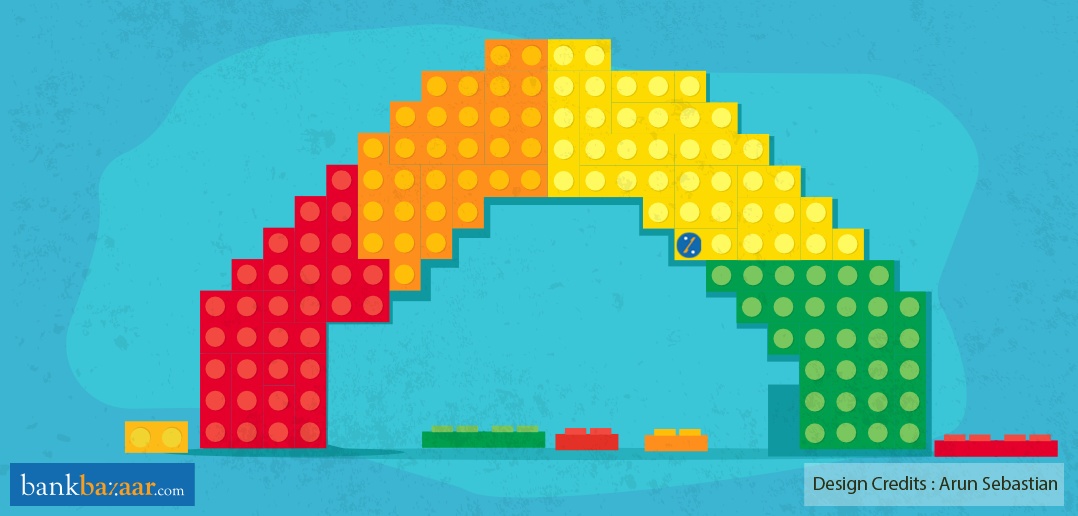Want to take your Credit Score from zero to 750+? Here are some ways to get you started.

Checked your Credit Score? Is it zero? Then, you will have to build your Credit Score. And building your Credit Score from zero is much like a catch-22 situation. How? No one will give you a loan or Credit Card because you don’t have any credit history and to build a Credit Score, you need to repay your loan and Credit Card bills on time. Now, is there a way out of all this? Of course! Here’s what you should do.
Open A Savings Account
The fact that you have a relationship with a bank can help you get a financial product from that bank. Got a salary account? Then, that’s good because based on the money in your salary account, banks tend to provide pre-approved loans and Credit Cards. Even for Savings Accounts, they provide these offers based on the balance in your account. You can directly apply for any of those offers from your internet banking account.
Haven’t got any offers yet? Then, you should start a Fixed Deposit or a Recurring Deposit.
Additional Reading: How Different Types Of Credit Can Boost Your Credit Score
Get A Deposit
Based on the deposit amount, banks usually provide secured Credit Cards or loans. Your deposit acts as collateral for the bank to trust you and provide you with that loan or Credit Card. Most banks offer a credit limit for your card based on the deposit that you have with them. Note that loan against Fixed Deposit is not reported to credit bureaus unless you default on the loan.
You can, of course, use these Credit Cards like any other Credit Card to buy things or make payments. In case you default on your payments for a long time, the bank might use the money from your deposit to pay your Credit Card balance. So, if you get a secured Credit Card, make sure that you pay your bills on time. Haven’t got the money for a deposit? You could get help.
Get An Add-on Card
Any of your family members may have Credit Cards. Ask them to get you an add-on card. By doing this, the card’s payment history will get added to your Credit Score. However, ensure that the person who gave you the add-on card is diligent when it comes to paying their bills because they will be paying the bills for your card too.
Check if the card transactions are being reported to Credit bureaus by checking your Credit Score often. If you didn’t know, you can check your Credit Score how many ever times you want without it having any impact on your score.
Need money urgently with Zero Credit Score?
Additional Reading: The Credit Score Guide For 20-Somethings
Get A Guarantor
You can ask someone with a good Credit Score to help you get a loan. Most banks provide loans to people with zero Credit Score if they can get a guarantor. However, note that the guarantor will be equally responsible for the loan. So, if you default on the loan, the guarantor might be asked to repay it. Tell the guarantor about this upfront. Want to keep building your score? Here’s a hack.
Get A Long-Term Loan
Choose the longest possible tenure for your loan when you get a loan. This will help you in three ways. One is that your Equated Monthly Instalment (EMI) will be low. This will help you make payments without hassles. Second is that with every EMI payment that you make on-time, your Credit Score will improve. The third is that the longer the tenure of your loan, the longer will be your credit history. The age of loan accounts has an impact on your score. So, the longer the tenure of your loan account, the better will be your Credit Score.
Fix Those Errors
Sometimes wrong information on your credit report can cause your Credit Score to be zero. Check if all the information like your name, PAN, address, loan or Credit Card account details are correct. Fixing errors in the credit report will help ensure that all your account details are sent to the credit bureaus.
Additional Reading: 11 Things That Don’t Affect Your Credit Score
Before you start building your Credit Score, understand that
- You don’t have to pay interest on Credit Card balance. As long as you are paying your bills on time, your score will keep improving. There is no need to maintain a balance on your card or pay interest on the balance.
- You have to pay every bill on-time and in full. Paying only the minimum balance will lead to a huge balance on your card and your Credit Score may not improve. So, pay all your bills in full.
- You shouldn’t max out your card. Spending on your Credit Card is good for your score. However, spending all your credit limit is not great. Credit bureaus look at the credit utilisation ratio which is the amount spent when compared to the card’s credit limit. This ratio has to be less than 30%. So, if your credit limit is Rs. 10,000, it is best not to swipe your card for more than Rs. 3,000. So, always keep this in mind.
Note that the fastest change in your Credit Score can take 30-60 days to reflect on your credit report. So, the best way to build and improve your score is to do it steadily.
Ready to start building your Credit Score? Fixed Deposits and Credit Cards are right here. You can check your eligibility for FREE!